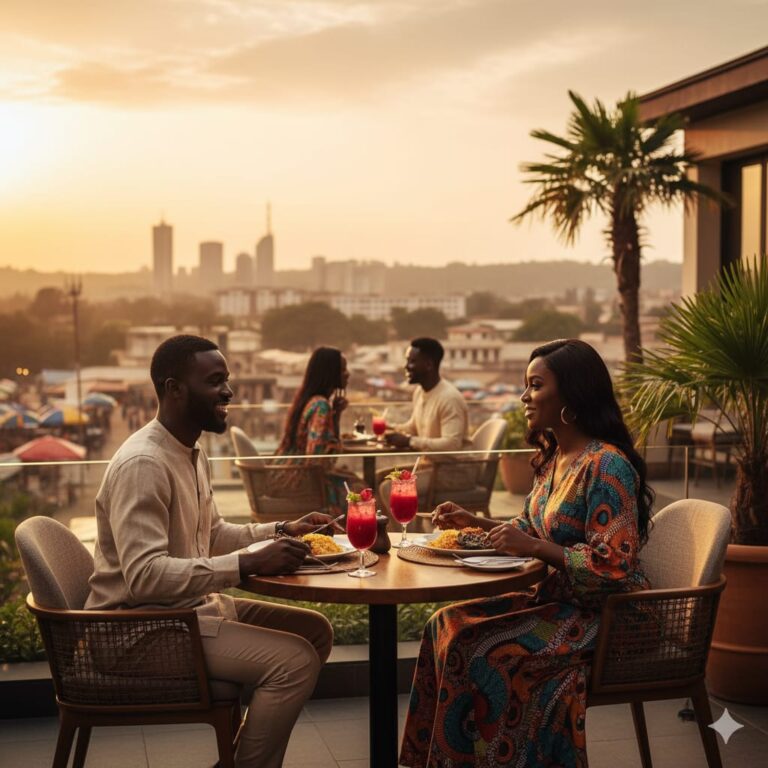Honestly, long-distance anything is hard. But a long-distance relationship? That one requires a special kind of courage. And in Ghana, where our culture is deeply rooted in closeness, shared moments, and physical presence, being apart from your partner can feel like an emotional marathon.
Still, many couples are doing it… and succeeding beautifully.
If you’re in a long-distance relationship, or thinking about starting one, this conversation is just for you. Let’s talk honestly, warmly, and without filters.
Why Long-Distance Relationships Feel Extra Hard in Ghana
Ghanaian relationships thrive on connection; visiting each other, sharing food, attending church together, celebrating milestones, and just being present. So when one person has to travel for school, work, or migration, it changes the dynamic completely. A long-distance relationship forces you to communicate differently.
- To trust deeper.
- To love without always touching.
It’s not easy, but it’s definitely not impossible.
The Reality of Long-Distance Relationship Challenges

Here are the biggest struggles many Ghanaian couples face:
1. Communication Gaps
Communication is the lifeline of any relationship, but in a long-distance relationship, it becomes the heartbeat. In Ghana, where many people juggle tight work schedules, busy traffic routines, or unstable network connections, staying connected can be tougher than expected.
You may plan a call and suddenly the network misbehaves. Or you are free in the evening, but your partner is exhausted after work. Or time zone differences make it hard to talk when one person is awake and the other is sleeping.
These interruptions can create emotional gaps. Sometimes, one person may begin to feel ignored, or start imagining the worst simply because communication wasn’t consistent.
It’s not that the love is gone — life just gets in the way.
That’s why long-distance couples must communicate intentionally. Not perfectly. Intentionally.
2. Trust Issues
Trust is tested deeply in a long-distance relationship. When you do not physically see your partner often, your mind starts filling in the blanks. A missed call can feel like rejection. A delayed response may feel suspicious. And social media can sometimes make insecurities louder.
In Ghana, the culture of “let me see you often” is strong, so when one person is far away, the fear of someone else stepping in becomes a real emotional struggle.
Even harmless things — like your partner hanging out with friends, not posting you online, or suddenly getting busy — can easily trigger doubts. But long-distance love cannot survive without trust. It needs transparency, reassurance, and vulnerability from both sides.
3. Emotional Loneliness
This is one of the hardest parts. There are days you just want your partner’s presence — not a voice note, not a picture, not a video call — but their physical presence.
- You want a hug.
- You want to hold hands.
- You want someone beside you during a tough moment, or someone to celebrate with after a big achievement.
And when they’re not there, the loneliness can feel heavy.
It’s normal to miss them deeply. It’s normal to have days when you feel emotionally empty.
Long-distance relationships require emotional strength, but they also require understanding that missing someone doesn’t mean the relationship is failing. It means you care.
4. Cultural Expectations
In Ghanaian culture, relationships are very community-centered. Families want to see your partner. Friends want to know the person you’re dating. And society loves observing relationships.
So when your partner is far away, the questions begin:
- “So where is your partner now?”
- “Are they coming for Christmas?”
- “Have you seen them this year at all?”
- “Ei, are you sure you people are still serious?”
And those questions may not always come with bad intentions, but they can make you feel pressured or insecure about your long-distance relationship.
Sometimes, your family may even express doubts because they believe relationships work better when people see each other often. And this cultural expectation can create emotional pressure on both partners.
Being in a long-distance relationship means learning to balance your cultural environment with your personal commitment.
5. Finances and Travel Stress
Traveling in Ghana is not cheap — not even for domestic trips. Whether your partner is in another city or another country, regular visits require money, planning, and sacrifices.
- Flight tickets.
- Transport costs.
- Taking time off work.
- Accommodation in some cases.
It all adds up. And sometimes, financial pressure can cause misunderstandings, especially if one partner expects the other to visit more often.
But love isn’t measured by how many times you travel; it’s measured by effort, communication, and understanding.
What Makes a Long-Distance Relationship Work?

1. Clear Communication
Communication is not just talking — it’s understanding each other deeply.
In a long-distance relationship, you cannot rely on physical closeness, so words become everything.
Clear communication means:
- Saying how you feel even when it feels awkward.
- Being honest when something is bothering you.
- Asking questions instead of assuming.
- Checking in regularly, not randomly.
- Sharing daily life moments — not just big updates.
It could be simple things like:
- “I’m home now.”
- “Work was stressful today.”
- “I really miss you.”
These small messages keep the relationship warm.
Poor communication creates emotional distance faster than physical distance ever will.
But communicating clearly and consistently makes both partners feel safe, valued, and connected.
2. Trust, Trust, Trust
Trust is the backbone of every long-distance relationship. Without it, love suffocates under fear and assumptions.
Trust means believing that your partner’s love is genuine, even when you can’t physically see it every day.
It means giving them the benefit of the doubt, not rushing to conclusions.
Building trust looks like:
- Being transparent about your activities.
- Avoiding secrecy.
- Being accountable without being controlled.
- Creating healthy boundaries with friends and the opposite sex.
- Reassuring each other when insecurities rise.
You don’t build trust in one day — you build it through consistency, honesty, and emotional openness.
And remember:
Distance does not create mistrust — silence, inconsistency, and secrecy do.
3. Intentional Effort
In a long-distance relationship, effort speaks louder than words. The distance makes love something you do, not just something you feel.
Intentional effort can look like:
- Planning virtual dates.
- Watching a movie together while on a call.
- Sending surprise messages or small gifts.
- Praying together over the phone.
- Recording voice notes or short videos that show your face and emotion.
- Checking in during busy days so your partner still feels seen.
Effort makes your partner feel chosen — not just tolerated.
Relationships die when effort dies.
But they flourish when two people keep showing up, even in small ways.
4. Prayer
A relationship becomes stronger when God is involved. Prayer keeps both hearts aligned, protected, and connected spiritually. Praying together doesn’t have to be long or complicated. It can be:
- “Let’s pray before we sleep.”
- “Let’s pray for this month.”
- “Let’s invite God into our plans.”
Prayer creates unity even when distance separates you physically.
- It reduces fear.
- It strengthens trust.
- It keeps love grounded in purpose, not just emotions.
Couples who pray together grow together — and overcome challenges with supernatural strength.
5. Vision for the Future
This is one of the most important parts. A long-distance relationship without a clear future becomes emotionally exhausting. You need a vision — a plan — a timeline.
Ask yourselves:
- Where is this relationship going?
- Who is moving eventually?
- When will the distance end?
- Are we both committed to the same future?
Having a shared vision gives hope during lonely seasons.
It helps you endure difficult days because you know the distance is temporary, not permanent.
A relationship becomes stronger when both people work toward the same destination — not walking blindly without direction.
So… Do Long-Distance Relationships Work in Ghana?
The answer is YES, if both partners want it to work.
- Distance doesn’t kill love; lack of effort does.
- Distance doesn’t break connection; silence does.
- Distance doesn’t weaken relationships; inconsistency does.
But love that is intentional, honest, prayerful, and committed can survive anything—including distance.







